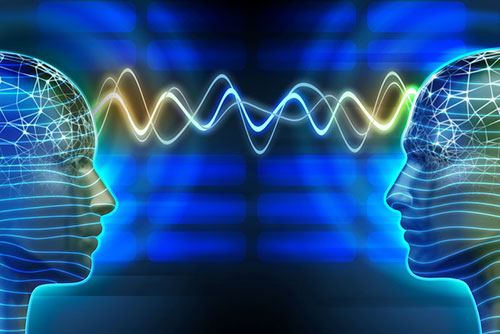sensing
The Romantic Challenges Of Being An Empath
 I frequently do readings for clients who are discovering their empathic abilities, as well as awakened empaths who are still working on their self-empowerment. The majority of empaths that I have worked with over the years have all been in very high-stress romantic situations that do nothing but magnify what these highly sensitive people are already experiencing. While this is no doubt confusing, frightening and intense for the empath, one must consider the fact that it also greatly impacts their partners.
I frequently do readings for clients who are discovering their empathic abilities, as well as awakened empaths who are still working on their self-empowerment. The majority of empaths that I have worked with over the years have all been in very high-stress romantic situations that do nothing but magnify what these highly sensitive people are already experiencing. While this is no doubt confusing, frightening and intense for the empath, one must consider the fact that it also greatly impacts their partners.
An empath a highly sensitive person who is very aware of the feelings, moods and motivations of other people and are deeply affected by the energies around them. This is experienced by the empath in many ways, including as physical sensations, moods, and emotions, as well as an inner knowing of what lies beneath the surface of other people’s words and actions. An empath has the ‘psychic radar’ to hone in intuitively on the truth of a person or situation.
Relationships, especially romantic ones, can therefore be a nightmare for empaths, and their partners. While their partner may be saying one thing, the empath ‘knows’ or ‘feels’ something different, and can sense if their partner is being dishonest or deceitful. While this can be useful at times to protect the empath from pursuing relationships with the wrong kind of person, it can also be very damaging and destructive to a potentially happy, healthy relationship with loving partner.
It can be very disconcerting and intimidating for the romantic partner of an empath to feel so constantly questioned, judged and exposed. I get many calls from empaths who are deep in an argument stemming from their partner’s refusal to come clean about what is really going on, or what they are truly feeling. The more the partner protests, the more the empath pushes and prods, leading the partner to shut down, withdraw, or disconnect completely.
Two Easy Ways To Start Meditating!
 Meditation is the go-to spiritual practice for millions of people all over the world. Not only does it offer incredible benefits for clarity of mind and overall well-being, it is also a powerful self-care tool to help us navigate our lives for our highest good.
Meditation is the go-to spiritual practice for millions of people all over the world. Not only does it offer incredible benefits for clarity of mind and overall well-being, it is also a powerful self-care tool to help us navigate our lives for our highest good.
But, for newbies getting started with a meditation practice can be challenging at first. I often hear people say, “I can’t meditate, I fall asleep every time,” or “Oh, I tried meditating, but I got too distracted, because I can’t properly clear my mind.”
If this sounds like you, please know that many beginners struggle with the notion that in order to ‘properly’ meditate, one must sit motionless, eyes closed, and clear your mind of all thoughts, and that an inability to do so means that they’ve failed to meditate, or that meditation is ‘not for them.’
The truth is meditation is called a ‘practice’ because it really does take practice to develop and master. But that does not mean it has to be complicated or difficult. Anyone can learn to meditate. To develop your meditation skills more easily, I suggest you begin with a meditation routine in one of two ways: guided meditation, or nature meditation.
Guided Meditation
We have ease of access to guided meditations these days due to convenient advances in digital technology. Gone are the days of having to attend a meditation class in person, or struggling with audio cassette tapes! These days high quality guided meditations can be instantly downloaded or streamed from various websites, apps, and social media platforms. All you need is your smartphone, and a pair of earphones or a headset.
My Symptoms Of Spiritual Awakening
 I often get questions about spiritual awakening. Is it real, and how do you know if you are experiencing it? There are many different lists of ascension symptoms available online, but it is no easy task to know which is more accurate or reliable.
I often get questions about spiritual awakening. Is it real, and how do you know if you are experiencing it? There are many different lists of ascension symptoms available online, but it is no easy task to know which is more accurate or reliable.
In my opinion Karen Bishop’s list is the best. She wrote that “we all experience our spiritual development in our own unique way. For some of us the changes occur slowly; for others a series of events can trigger sudden growth. We do not all share the same symptoms or changes”. I therefore can’t account for all of the symptoms, but I am going to share some of the experiences I’ve personally had as a psychic. I am not listing these things in any particular order, as I can’t remember what I noticed happening first.
Feeling Disoriented
I had no sense of direction. I found my way around the city, not by knowing which the north end is and which is the south, but because I have gotten lost so many times! Every time I left my house I got lost. I live right off the main street that divides the city. Everything is either North or South. If you are one block north, then the addresses will all be in a certain range, and vice versa. Simple enough. But, by the time I would realize I was going the wrong way, I would turn off, turn around and proceed in the opposite direction. Only to find out that I have continued on in still the wrong direction. I think my record was four times in a row!
Unusual Aches And Pains
I experienced physical discomforts that for us women are often simply chalked up as ‘menstrual’. The pains were usually in the lower back and neck area. For me, it felt as though someone is pushing on my head so hard they are compressing my neck.
How To Avoid Empath Ego-Traps
 Being an empowered empath is a wonderful gift and blessing. But the empath ‘label’ can also become problematic when it is misconceived by some as meaning more than it truly signifies.
Being an empowered empath is a wonderful gift and blessing. But the empath ‘label’ can also become problematic when it is misconceived by some as meaning more than it truly signifies.
There are very common ego-traps that some empaths and highly sensitive people get hung up on with regards their empathic experiences. These ego-traps can be very counterproductive, as it may actually be holding them back from meaningful personal growth and progressing our spiritual path.
These ego traps are easy to get wrapped up in, but they are not a sign of weakness or failure. The experience of being an empath is often intense and confusing. These ego-traps offer lessons for us that often go hand-in-hand with life as an empath.
Some of the typical empath ego-traps are as follows:
Empaths Always Know Best
Assuming we are always right about how we ‘read’ a situation or person, or needing to save everyone and be everybody’s ‘therapist.’ We may have a good read that something is amiss, or that someone is upset, but its unwise to assume we always know exactly why.
Often empaths will feel something from someone and decide for themselves why that person is feeling that way. This is a good way to create conflict and tension in relationships! Instead of assuming, rather ask.
And if the person doesn’t want to talk about it, try assuming it is not about you, and that maybe you have no idea what is really upsetting them. Start there. Give the person space and do not make it about you. Continue reading
Being An Empath Is No Excuse
 There’s nothing wrong with identifying as an empath. Actually, it can be beneficial to step into this truth for oneself, and own your empathic experiences as a significant aspect of your life.
There’s nothing wrong with identifying as an empath. Actually, it can be beneficial to step into this truth for oneself, and own your empathic experiences as a significant aspect of your life.
But for many people it is difficult to take on this ‘label,’ because they don’t feel worthy or they feel they are saying, “I’m more special than other people.” In these cases, there is great benefit in coming to terms with being an empath because it doesn’t have to mean either of those things.
Being an empath is not something they have to be worthy of – it’s a trait they either have or don’t have. And it’s not a matter of being better or ‘more special’ than anyone else – that notion comes from a fear of being judged.
Being an empath means being highly sensitive to emotional energies, and feeling those emotions in your own body as if they were your own. The term ‘empath’ is just a word we can use to describe this trait.
There is some scientific evidence for the empath experience. Studies* show we all have a very specific group of cells in our brain responsible for empathy and compassion, called the Mirror Neuron System. In the brain of highly empathic people, it is thought this group of cells may be hyperactive or hypersensitive.
Being an empath is a wonderful blessing and gift, instead of it being a ‘curse,’ weakness or disability. However, it is important for the empath to become empowered and own their sensitivity.
In order to accomplish this, it is vital for the empath to avoid adopting a ‘victim mentality’ or constantly blaming everything negative that happened in their life on the fact that they are an empath.
Some empaths erroneously believe many of the struggles they encounter can’t be overcome. They assume that they will always be crippled in some way by their experience as an empath. This is false. They may have specific experiences and lessons because they’re an empath, but these are opportunities for growth. Some of the ways this manifests are:
Telepathy Is Our True Spiritual State
 I can read other people’s thoughts. It is known as telepathy, or the direct transference of thoughts from one person to another without using the usual sensory channels of communication. It is a psychic ability, or what parapsychologists refer to as extrasensory perception (ESP).
I can read other people’s thoughts. It is known as telepathy, or the direct transference of thoughts from one person to another without using the usual sensory channels of communication. It is a psychic ability, or what parapsychologists refer to as extrasensory perception (ESP).
My first awareness of being telepathic was around age three. As a child I thought everyone could read other people’s thoughts. It wasn’t until my early teens that I realized this was not the case.
Being a telepath is not necessarily fun. I sometimes hear, for example, people judging me in their thoughts. These brief telepathic perceptions can be so sudden and unexpected that they completely stop me in my tracks for a moment.
For instance, I could be teaching a class, and suddenly I ‘hear’ one of the students thinking something hostile, disparaging or disturbing about me. When this happens, it can make it difficult for me to continue speaking or functioning for a few seconds.
I have become much better at dealing with this as an adult, but it was very difficult for me as a child. I would often glare at the person, which I think freaked them out. I have since come to understand that their ‘mean thought’ is very fleeting, and that people have many other thoughts at the same time. They normally do not even notice or remember the thought they had about me, so they would not know why I was glaring at them.
Consider your own thought patterns and self-talk habits for a moment. Most people have a lot going on in their mind all at once. Imagine how overwhelming this can be for someone else – to get into your head and hear some of that chatter. Some of it can actually be quite alarming or upsetting. Being telepathic can be both a blessing and a curse.
Cleansing Unwanted Spirit Energies In Your Home
 Benevolent spirit energies are everywhere. Whether it be a loved one who has crossed over, or your spirit guides and angels. Spirit is simply around in every moment of our daily lives. However, there are also earthbound spirits who have passed, but not yet crossed over. They have unfinished business in this world, or they have difficulty leaving the people and physical spaces that they had a connection to in this life.
Benevolent spirit energies are everywhere. Whether it be a loved one who has crossed over, or your spirit guides and angels. Spirit is simply around in every moment of our daily lives. However, there are also earthbound spirits who have passed, but not yet crossed over. They have unfinished business in this world, or they have difficulty leaving the people and physical spaces that they had a connection to in this life.
These restless, earthbound spirit energies can wreak havoc in our homes and families. When I was a child, I had horrible nightmares. While we only lived on the main floor in my childhood home, I was fine. However, after my father had built the upper level of the house and I was moved into my pretty, girly bedroom, the nightmares began.
I never felt comfortable or secure in my new bedroom. Also, whenever I had to go into the basement, I would have to run down and back up, because of the ominous, icy cold feeling I would experience through my entire body. The rest of the house however was never an issue.
I later inherited this house, after both my parents had passed. I did not really want to own it, because even as an adult that same feeling in the upstairs and the basement was still haunting me, while the main floor felt warm and comforting. I refused to go there alone at night, and rarely alone even in the daytime. It was confusing and frustrating to say the least.
Then I learned how to sage and energy cleanse a home properly. My method involves white sage and a small white candle. I go into each room of a house, starting at the furthest room from the door and smudge each corner of the room. I slowly cleanse each corner and ask all unwelcome spirit entities present to follow the light of the candle as we progress through the house, room by room, towards the outside door.